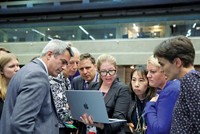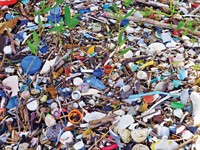Advertisement
Grab your lab coat. Let's get started
Welcome!
Welcome!
Create an account below to get 6 C&EN articles per month, receive newsletters and more - all free.
It seems this is your first time logging in online. Please enter the following information to continue.
As an ACS member you automatically get access to this site. All we need is few more details to create your reading experience.
Not you? Sign in with a different account.
Not you? Sign in with a different account.
ERROR 1
ERROR 1
ERROR 2
ERROR 2
ERROR 2
ERROR 2
ERROR 2
Password and Confirm password must match.
If you have an ACS member number, please enter it here so we can link this account to your membership. (optional)
ERROR 2
ACS values your privacy. By submitting your information, you are gaining access to C&EN and subscribing to our weekly newsletter. We use the information you provide to make your reading experience better, and we will never sell your data to third party members.
Pollution
Is the US really changing its plastic policy?
A White House closed-door meeting left many questions, but environmental advocates are cautiously optimistic
by Leigh Krietsch Boerner
August 19, 2024

In closed-door briefings with industry and advocacy groups on Aug. 14, a White House representative announced that the US is no longer against supporting global goals to cap plastic production. This marks a considerable shift from the nation’s previous stance on plastics, which focused on the preferences of individual countries and reducing waste. The White House briefings lacked detail, but environmental advocates say they’re cautiously optimistic about the change.
Jonathan Black from the White House Council on Environmental Quality (CEQ) read from a prepared statement at two separate online briefings, one for industry members and one for groups of environmental advocacy organizations. Sources present say Black announced that the US is now considering methods to curb plastic pollution that had been effectively off the table in the past, such as limiting new plastic production and putting restrictions on the use of some chemicals in plastics. However, he did not mention any specific limits or note when any changes might occur. The White House released a report in July outlining a US government–wide approach for addressing plastic pollution, but the document similarly lacks details on policies or time frame. The US is one of the world’s largest manufacturers of plastic and is the world’s largest producer of plastic waste.
Reuters broke the news of the first briefing shortly after it ended, but the White House has not put out a public statement about the briefings nor their content. CEQ spokesperson Justin Weiss told a Politico reporter that there would not be a statement forthcoming. When asked to verify this or statements from the meetings, Weiss told C&EN by email that he could only confirm that the reporting in the Reuters story is accurate, and the CEQ had no further comment at this time.
A representative from the industry group the American Chemistry Council (ACC) verified that they attended the industry briefing. ACC president and CEO Chris Jahn called the US’s position change a lose-lose situation. “The White House has signaled it is willing to betray U.S. manufacturing and the hundreds of thousands of jobs it supports,” he says in a statement. The Plastics Industry Association also released a statement opposing the new approach, calling it “misguided.”
Environmental advocates are cautiously optimistic about what the US said in the briefing, but they aren’t ready to count it as a win. According to Jamala Djinn, science policy advisor at the advocacy group Break Free from Plastic, White House representatives said that they’re open to conversations on pursuing global legally binding control measures on primary plastic polymers, chemicals of concern, and problematic unnecessary plastic products. But while the announcement was welcome and appears to resemble what environmental advocacy groups have been pushing for in the United Nations plastics treaty, “I would not call it a policy shift,” Djinn says. “It is more of a narrative shift than anything.” The US needs to put forward some kind of written proposal before advocacy groups will take the shift seriously, she says.
Frankie Orona from the advocacy group Society of Native Nations agrees that what Black said in the briefing to environmental advocacy groups included many sentiments the groups wanted to hear, but there was not much clarity or context. There was no time frame and no information about new processes or procedures, he says. It also seems to be in contrast with government subsidies of chemical recycling, which requires using virgin plastic, and ballooning US plastic production. The briefing came about a week before the start of the next meetings of the United Nations Intergovernmental Negotiating Committee (INC) on Plastic Pollution, to be held Aug. 24–28 in Bangkok, which will focus on moving an international treaty forward. The final official meeting, INC-5, is scheduled for Nov. 25 to Dec. 1 in Busan, South Korea. Two of the more hotly debated issues in treaty negotiations have been including caps on plastic production and limiting makers’ use of chemicals known to be harmful in plastics.
Some stakeholders wonder whether the treaty timeline should be expanded. “We need to get [the treaty] right the first time if it’s really going to be meaningful,” Orona says. But the US hasn’t asked for more meetings, nor was that mentioned at the Aug. 14 briefing, he says. Orona is generally optimistic about the future of US plastics policy but doesn’t believe the US is sincere without a public statement or action at INC-5. “Until then,” Orona says, “it’s just more words.”





Join the conversation
Contact the reporter
Submit a Letter to the Editor for publication
Engage with us on Twitter